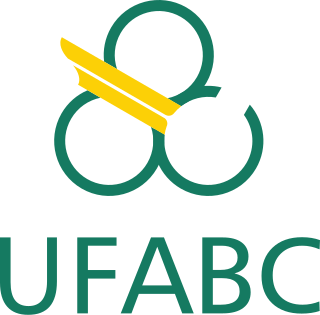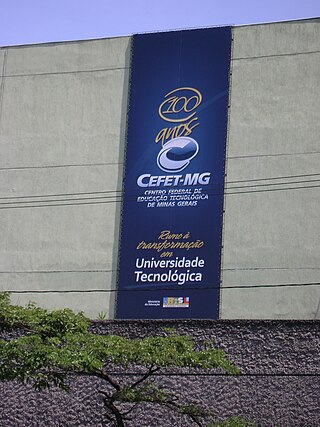Related Research Articles

Undergraduate education is education conducted after secondary education and before postgraduate education, usually in a college or university. It typically includes all postsecondary programs up to the level of a bachelor's degree. For example, in the United States, a student pursuing an associate or bachelor's degree is known as an undergraduate student while a student pursuing a master's or doctoral degree is a graduate student. Upon completion of courses and other requirements of an undergraduate program, the student would earn the corresponding degree. In some other educational systems, undergraduate education is postsecondary education up to and including the level of a master's degree; this is the case for some science courses in Britain and some medicine courses in Europe.

The State University of Campinas, commonly called Unicamp, is a public research university in the state of São Paulo, Brazil.

The University of Brasília is a federal public university in Brasília, the capital of Brazil. It was founded in 1960 and has since consistently been named among the top five Brazilian universities and the top fifteen universities in South America by Times Higher Education (THE).
The Vestibular is a competitive examination and is the primary and widespread entrance system used by Brazilian universities to select the students admitted.
Bandeirante University of São Paulo is a private university in São Paulo, Brazil. It is one of the largest institutions of higher learning in the country, with approximately 75,000 undergraduate and graduate students and thirteen campuses in the cities of São Paulo, Osasco and São Bernardo do Campo. Uniban is owned by Anhanguera Educacional, the biggest for-profit educational company in Brazil.

Federal University of ABC is a Brazilian federal public institution of higher learning based in Santo André and São Bernardo do Campo, municipalities belonging to the ABC region, both in the state of São Paulo.

The Federal University of Technology – Paraná is a federal university with campuses in thirteen cities located in the state of Paraná.

The São Paulo State Technological Colleges are public institutions of higher education maintained by the State Center of Technological Education (CEETEPS). FATECs are important Brazilian institutions of higher education, being pioneers in the graduation of technologists. They are located in several cities of the São Paulo state, with four campuses in the capital, and several other units in the metropolitan region of São Paulo, countryside and seashore.
Brazil adopts a mixed system of public and privately funded universities. Public universities can be federally funded or financed by State governments. Private schools can be for-profit or, in the case of Catholic universities, not-for-profit.

The Federal Center for Technological Education of Minas Gerais is an education center located in the Brazilian state of Minas Gerais.
The Federal University of Sergipe is a Brazilian public institution based in Sergipe, with campuses in São Cristóvão, Aracaju, Itabaiana, Laranjeiras, and Lagarto. Founded in 1967 by the junction of the state's existing colleges, it became its second university and its first public one. It became the state's most reputable and competitive higher education institution, ranking among the country's 40 best universities and Latin America's top 200 list.

Fernando Haddad is a Brazilian scholar, lawyer and politician who has served as the Brazilian Minister of Finance since 1 January 2023. He was previously the mayor of São Paulo from 2013 to 2017 and the Brazilian minister of education from 2005 to 2012.

Professor Paulo Neves de Carvalho Government School is a Brazilian state funded single institution of higher education, based in the city of Belo Horizonte, Minas Gerais. The school offers undergraduate, masters, specialization and extension programs in the area of Public Administration. The School of Government is part of the João Pinheiro Foundation, and is linked to the government of Minas Gerais through the Secretary of State for Planning and Management (SEPLAG).

Insper is a Brazilian non-profit higher education institution located in the Vila Olympia district close to the new business centre of São Paulo, Brazil. The university offers higher education courses on fields of Business Administration, Economics, Computer Engineering, Mechanical Engineering, Mechatronics Engineering, Law and Computer Science.

Centro Universitário das Faculdades Metropolitanas Unidas is a Brazilian institution of higher education located in the city of São Paulo. The university is better known by the acronym FMU, which is maintained for the sake of tradition, since it has been popularly called FMU since its founding.
The Jeová Rafá Theological Institute is an independent non-denominational institution of higher education in Itapipoca, Ceará State (CE), in northeast Brazil. It is one of a significant number of Evangelical Christian educational institutions in Brazil offering theological qualifications primarily by distance learning. The institute offers online courses ranging from foundation, bachelors, masters, to doctoral degrees.

The Federal Institute of Education, Science, and Technology of Ceará(IFCE) is a Federal Institute of higher, basic, and professional education, pluricurricular and multicampus, operating in Ceará, Brazil. Specialized in offering professional and technological education in the different teaching modalities, IFCE is based on the conjugation of technical and technological knowledge with pedagogical practice and operates in all regions of the state through its 32 campuses, serving more than 33,000 students in a total installed area of over 5.9 million m2.
The Programa Universidade para Todos, also known as ProUni, was created by the Brazilian Federal Government and developed by Fernando Haddad, Minister of Education at the time, with the purpose of providing full and partial scholarships in undergraduate and sequential courses of specific training in private higher education institutions. It was instituted by Law No. 11,096 of January 13, 2005 during Lula's administration.
The Sistema de Seleção Unificada is a digital platform launched in January 2010 and developed by the Brazilian Ministry of Education (MEC). It is used by students who attended the National High School Exam to apply to higher education institutions that use ENEM scores as a method of admission. From 2024, the system will be limited to one edition per year, which will be held in January.

The Curso de Ciências Moleculares, also known as CCM, CM, or CECM, is an undergraduate option at the University of São Paulo aimed at students seeking a professional career in research and development. Its curriculum emphasizes academic freedom, interdisciplinarity, and multidisciplinarity.
References
- 1 2 3 4 Prata, Pedro (2022-05-09). "Fies foi criado no governo de FHC e expandido sob gestão de Lula". Estadão. Retrieved 2023-12-18.
- ↑ "LEI No 10.260, DE 12 DE JULHO DE 2001". Federal Government. Archived from the original on 2023-12-20. Retrieved 2023-12-18.
- ↑ "Juros do Fies são reduzidos pela metade". R7. 2010-01-15. Archived from the original on 2018-01-30. Retrieved 2018-01-29.
- ↑ "Fies foi criado durante governo de FHC, não na gestão de Lula". CNN Brasil. 2022-05-18. Archived from the original on 2023-12-19. Retrieved 2023-12-18.
- ↑ "Proposta aumenta prazo para estudante formado começar a pagar o Fies". Agência Câmara de Notícias. 2014-08-29. Archived from the original on 2023-12-19. Retrieved 2023-12-18.
- ↑ "Juros no início do governo Lula eram de 26,5%; taxa hoje é menos da metade". UOL. 2010-12-08. Retrieved 2023-12-18.
- ↑ Venturi, Jair (2015-03-15). "Fies: dois meses de incertezas". Gazeta do Povo. Archived from the original on 2015-03-22. Retrieved 2015-03-25.
- ↑ Borges, André (2016-01-01). "Minha Casa, Pronatec e Fies sofreram cortes de R$ 11 bilhões". Estadão. Retrieved 2023-12-18.
- ↑ Saldana, Paulo (2016-01-02). "No ano do lema 'Pátria Educadora', MEC perde R$ 10,5 bi, ou 10% do orçamento". Estadão. Archived from the original on 2023-12-19. Retrieved 2023-12-18.
- ↑ "Fies vai voltar a atender cursos com mensalidade de até R$ 7 mil, anuncia MEC". G1. 2018-06-06. Retrieved 2023-11-14.
- ↑ "Cursos de medicina terão novo teto de financiamento no Fies". MEC. 2022-07-27. Retrieved 2023-11-14.
- ↑ Bischoff, Wesley (2012-06-14). "Ministério da Educação aumenta teto do Fies para curso de medicina". G1. Archived from the original on 2023-11-14. Retrieved 2023-11-14.
- ↑ Máximo, Wellton (2023-06-01). "Fies financiará até R$ 60 mil por semestre de cursos de medicina". Agência Brasil. Retrieved 2023-11-14.
- ↑ Bermúdez, Ana (2017-07-06). "Novo Fies terá juro zero para 100 mil alunos por ano". UOL. Archived from the original on 2023-11-14. Retrieved 2023-11-14.
- ↑ "FIES". MEC. Archived from the original on 2023-12-18. Retrieved 2023-12-18.
- ↑ "Publicado resultado da pré-seleção do Fies para o segundo semestre de 2018". MEC. Archived from the original on 2023-12-19. Retrieved 2023-12-18.
- ↑ "Resultado do Fies: Entenda tudo sobre Classificação e Pré-seleção". Descomplica. 2023-03-01. Retrieved 2023-12-19.
- ↑ Bertin, Carlos Eduardo. "Entenda o que é aditamento simplificado e aditamento não simplificado no Fies". Foco no ENEM. Retrieved 2023-12-18.
- 1 2 "Como funciona o financiamento no Fies". Descomplica. 2023-03-02. Retrieved 2023-12-19.
- ↑ "OPERACIONALIZAÇÃO FINANCEIRA DO NOVO FIES". ABMES. 2018-11-21. Archived from the original on 2023-12-19. Retrieved 2023-12-19.